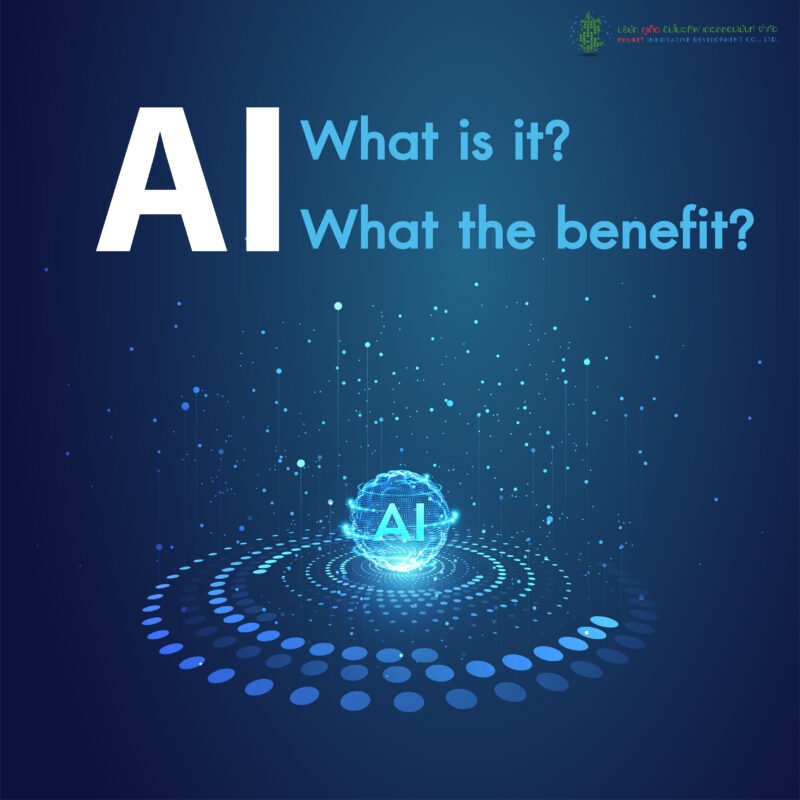
Nowadays you may have heard the term “AI” quite often, and if you are not in the IT or computer technology industry, you may not clearly understand the meaning of AI. Today, let’s get to know the term AI together.
“AI” stands for “Artificial Intelligence”, which means ‘machine intelligence’. It is a scientific field that focuses on enabling computers to receive data, process it, and display results, along with the ability to learn, remember, and make decisions on various matters, similar to how the human brain works.
Currently, AI technology is increasingly being integrated into human daily life. For example, Google’s AI helps fulfill the need for information search, and Alexa AI, an intelligent assistant, can turn your home into a Smart Home, among others.
The working principle of AI
The operation of AI requires the use of input data in various forms, such as text, sound, images, and others, depending on how the AI creator configures it. AI then processes and responds to the data in various formats, whether it be sound, text, images, videos, etc. We can then utilize the results for the user’s intended purposes.
Types of AI
- Based on processing capabilities:
1.1 Artificial Narrow Intelligence (ANI): AI with specialized capabilities that excel in specific tasks according to the creator’s objectives. For example, Amazon’s product recommendation system accurately suggests products based on customer preferences, and Google Translate provides accurate translations from various sources, including images, sound, and text.
1.2 Artificial General Intelligence (AGI): Comparable to human general intelligence in all aspects such as reasoning, computation, problem-solving, learning, and adaptability to various environments (still in research).
1.3 Artificial Super Intelligence (ASI): Surpasses human capabilities in all areas, able to solve complex problems faster than humans, learn new things faster, and adapt to diverse situations more efficiently than the average human (still in research).
- Based on technology usage:
2.1 Reactive Machines: AI in this category does not store memory but processes data once. Therefore, it cannot learn from past experiences or predict the future, suitable for specific problem-solving tasks, such as IBM’s Deep Blue defeating Garry Kasparov, the world chess champion, in 1997.
2.2 Limited Memory: Stores past knowledge to aid in future decision-making, suitable for more complex problem-solving tasks, such as Google Photos’ image recognition and categorization capabilities.
2.3 Theory of Mind: Understands human emotions and feelings, enabling appropriate interaction with humans (still in research).
2.4 Self-Aware: Has self-awareness, knowing that it is artificial intelligence, allowing it to make decisions and take actions independently (still in research).
Benefits of AI in daily life
AI technology can enhance convenience in various aspects of life, including work, learning, and leisure activities, such as:
- Voice commands for tasks
- Product and service recommendations
- Language translation
- Data analysis
- Automated transportation
AI and the future world: How should we adapt?
As AI technology becomes more widespread, some jobs may become redundant, leading to increased unemployment rates. Therefore, humans should develop new skills and knowledge, learn to work alongside AI, and prepare for future changes in the workforce.
Learning to work with AI efficiently involves:

- Voice commands for tasks

- Product and service recommendations

- Language translation

- Data analysis

- Automated transportation
AI and the future world: How should we adapt?
As AI technology becomes more widespread, some jobs may become redundant, leading to increased unemployment rates. Therefore, humans should develop new skills and knowledge, learn to work alongside AI, and prepare for future changes in the workforce.
Learning to work with AI efficiently involves:
- Continuous development of new skills and knowledge
- Efficient collaboration with AI
- Developing remote work skills
- Studying effective AI utilization in business
- Preparing for changes in work patterns
Remember, AI is created by humans. Therefore, humans should learn to work efficiently with AI by leveraging AI’s strengths in fast and accurate processing of complex tasks, combined with human skills in creative and empathetic work, to maximize work potential.
If you want your business to reach customers online and achieve sustainable marketing results, we are happy to provide consultation to help your business gain more recognition.
Contact us at 093 696 4498 or via email at mongkontep@pkindev.com. You can also visit our website at www.pkindev.com or connect with us on Line OA: https://lin.ee/po8XduU
Phuket Innovative Development Co., Ltd. adheres to ISO/IEC29110 standards and has received numerous awards and accolades.
Reference: thewisdom.co
